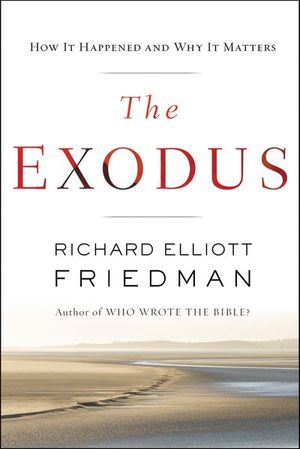The Exodus
“In fluent prose . . . makes a gripping and persuasive case that it was the Levites who escaped Egypt and carried the story of the Exodus into Canaan.” —The New York Times Book Review
The Exodus has become a core tradition of Western civilization. Millions read it, retell it, and celebrate it. But did it happen? Unable to find physical evidence until now, many archaeologists and scholars claim this mass migration is just a story, not history.
Pioneering Bible scholar and bestselling author of Who Wrote the Bible? Richard Elliott Friedman cuts through the noise — the serious studies and the wild theories — merging new findings with new insight. From a spectrum of disciplines, state-of-the-art archeological breakthroughs, and fresh discoveries within scripture, he brings real evidence of a historical basis for the exodus —the history behind the story. The biblical account of millions fleeing Egypt may be an exaggeration, but the exodus itself is not a myth.
Known for his ability to make Bible scholarship accessible to readers, Friedman proceeds to reveal how much is at stake when we explore the historicity of the exodus. We learn that it became the starting-point of the formation of monotheism, the defining concept of Judaism, Christianity, and Islam. Moreover, we learn that it precipitated the foundational ethic of loving one’s neighbors — including strangers — as oneself. He concludes, the actual exodus was the cradle of global values of compassion and equal rights today.
“Sensational and profound. An eye-opening study of perhaps the single most consequential event in the biblical narrative and one of the touchstones of both Jewish and Zionist aspiration.” —Jewish Journal
The Exodus has become a core tradition of Western civilization. Millions read it, retell it, and celebrate it. But did it happen? Unable to find physical evidence until now, many archaeologists and scholars claim this mass migration is just a story, not history.
Pioneering Bible scholar and bestselling author of Who Wrote the Bible? Richard Elliott Friedman cuts through the noise — the serious studies and the wild theories — merging new findings with new insight. From a spectrum of disciplines, state-of-the-art archeological breakthroughs, and fresh discoveries within scripture, he brings real evidence of a historical basis for the exodus —the history behind the story. The biblical account of millions fleeing Egypt may be an exaggeration, but the exodus itself is not a myth.
Known for his ability to make Bible scholarship accessible to readers, Friedman proceeds to reveal how much is at stake when we explore the historicity of the exodus. We learn that it became the starting-point of the formation of monotheism, the defining concept of Judaism, Christianity, and Islam. Moreover, we learn that it precipitated the foundational ethic of loving one’s neighbors — including strangers — as oneself. He concludes, the actual exodus was the cradle of global values of compassion and equal rights today.
“Sensational and profound. An eye-opening study of perhaps the single most consequential event in the biblical narrative and one of the touchstones of both Jewish and Zionist aspiration.” —Jewish Journal
BUY NOW FROM
COMMUNITY REVIEWS

